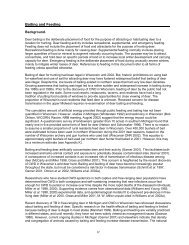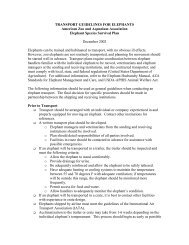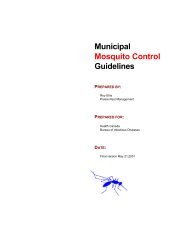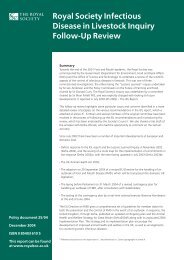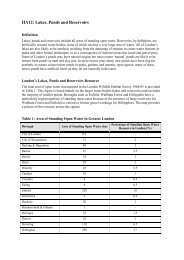Elephants Elephants - Wildpro - Twycross Zoo
Elephants Elephants - Wildpro - Twycross Zoo
Elephants Elephants - Wildpro - Twycross Zoo
You also want an ePaper? Increase the reach of your titles
YUMPU automatically turns print PDFs into web optimized ePapers that Google loves.
observation for an hour after vaccination and having adrenaline available are<br />
wise precautions.<br />
Diseases against which vaccination may be appropriate include:<br />
• Anthrax.<br />
• Clostridial disease.<br />
• Tetanus.<br />
• Pasteurellosis.<br />
• Pox.<br />
• Rabies.<br />
• Salmonellosis.<br />
<strong>Zoo</strong>noses<br />
Significant zoonotic infections that may originate from elephants include:<br />
• Cowpox.<br />
• Salmonellosis.<br />
• Rabies.<br />
• Tuberculosis (although transmission from man to elephant is far more<br />
likely).<br />
• Anthrax.<br />
3.16.2 Common Medical and Surgical Conditions of the Elephant<br />
Bacterial Disease<br />
Significant bacterial infections that can affect elephants include the following:<br />
Anthrax. Not generally a problem in zoos, but in areas of the world where<br />
anthrax is endemic (including Africa and Asia) captive working elephants are<br />
routinely vaccinated.<br />
Blackleg. Caused by Clostridium septicum. Vaccination is appropriate where a<br />
particular problem occurs.<br />
Botulism.<br />
Colibacillosis. Especially in the newborn and young. A lack of colostrum<br />
may be predisposing in juveniles.<br />
Enterotoxaemia. Young elephants are especially susceptible to clostridial<br />
enterotoxaemia. Where a problem exists in a facility, vaccination may need to<br />
be considered.<br />
Pasteurellosis. Also known as haemorrhagic septicaemia. Systemic<br />
pasteurellosis can cause an extremely acute and rapidly fatal septicaemia with<br />
signs similar to anthrax. Vaccination is a possibility for collections<br />
experiencing problems with this pathogen<br />
Salmonellosis. This is a common and often fatal infection in elephants.<br />
Symptoms often include a profuse diarrhoea, dysentery, weakness, fever etc.<br />
Other animals may present with far more vague symptoms; lethargy,<br />
117



